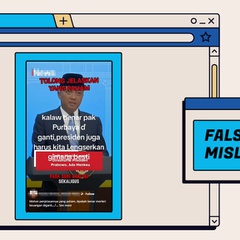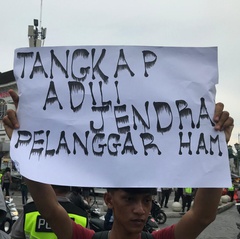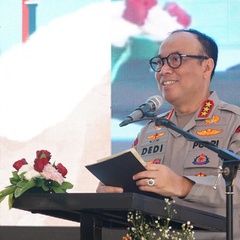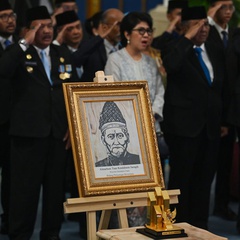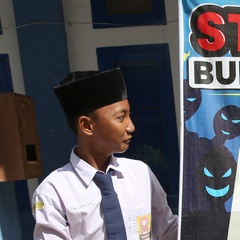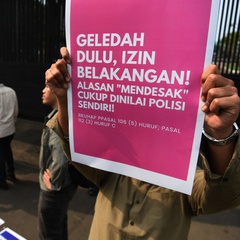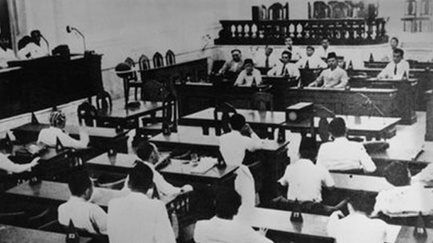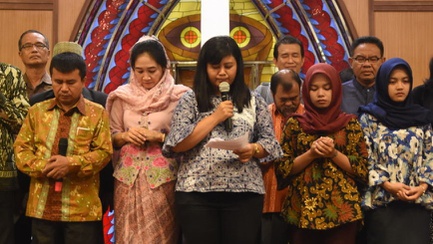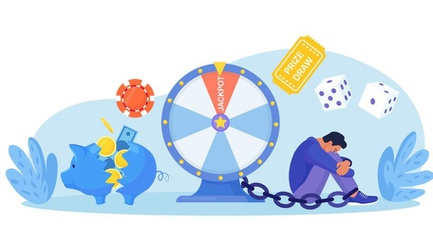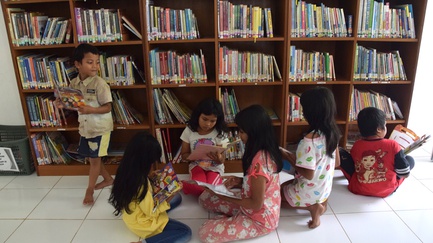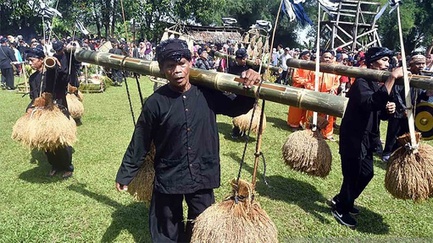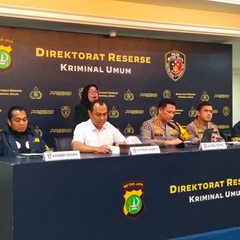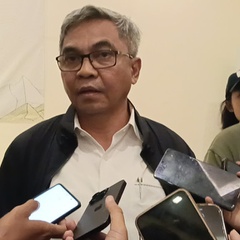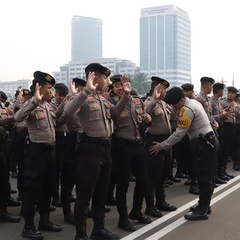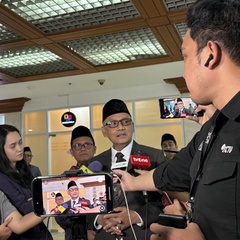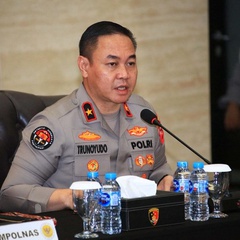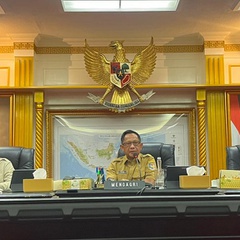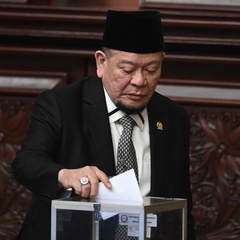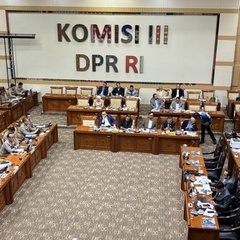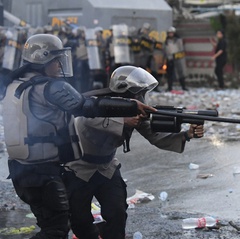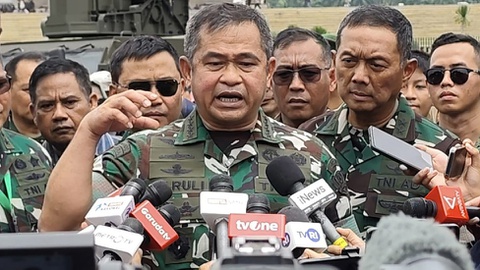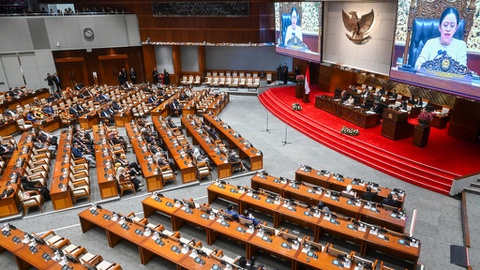tirto.id - Materi bahasa Inggris kelas 8 semester 1 Kurikulum Merdeka mencakup separuh dari total pembahasan yang diajarkan melalui buku English for Nusantara (2021). Simak rangkuman, contoh soal, dan link unduh bukunya di dalam artikel ini.
Pada dasarnya, materi kelas 8 bahasa Inggris semester 1 Kurikulum Merdeka mengarahkan siswa untuk mengeksplorasi penggunaan Bahasa Inggris di berbagai lingkungan kehidupan.
Materi bahasa Inggris kelas 8 Kurikulum Merdeka semester 1 juga mengajak siswa untuk mengenal kosakata baru. Pembelajaran juga meningkatkan kemampuan murid untuk menulis, membaca, menyimak, dan berbicara dalam bahasa Inggris.
Rangkuman Materi Bahasa Inggris Kelas 8 Semester 1
Materi bahasa Inggris kelas 8 semester 1 Kurikulum Merdeka dalam English for Nusantara mencakup tiga bab. Di antaranya adalah Chapter 0 (Beginning), Chapter 1 (Celebrating Independence Day), dan Chapter 2 (Kindness Begins with Me)
Berikut ini rangkuman materi kelas 8 semester 1 Kurikulum Merdeka bahasa Inggris.
1. Chapter 0: The Beginning
Chapter 0 (The Beginning) melampirkan materi yang memberikan pengetahuan tentang contoh kalimat bahasa Inggris untuk sejumlah situasi. Beberapa contoh kondisinya mencakup pembahasan berikut.a. Classroom Language (Percakapan di Kelas)
Peserta didik bisa menggunakan bahasa Inggris sebagai salah satu media komunikasi atau belajar di kelas. Untuk memahaminya, peserta didik bisa memantau contoh kalimat dan terjemahan berikut.- Would you pronounce the word “...”? (Bisakah kamu melafalkan kata “...”?)
- Open your book to page... (Buka buku kalian halaman...)
- May I ask you a question? (Bolehkah saya bertanya?)
b. Complimentary (Kalimat Pujian)
Kalimat pujian menyuguhkan kata-kata untuk memuji orang lain menggunakan tata bahasa yang utuh. Contoh kalimatnya biasa menggunakan kata-kata sifat seperti berikut.- It's beautiful (Cantik/indah sekali)
- What wonderful work! (Pekerjaan yang luar biasa)
- How extraordinary! (Luar biasa sekali)
c. Expressions of Certainty and Uncertainty (Pernyataan Yakin atau Tidak)
Peserta didik bisa merespons yakin maupun tidak terhadap suatu hal yang diperbincangkan. Siswa bisa menyampaikan pendapatnya dengan contoh pernyataan berikut.- Yes, I am certain (Ya, saya yakin)
- I’m absolutely sure (Ya, saya yakin)
- I have no doubt about it (Saya tidak ragu akan hal itu)
- I’m not sure about it (Saya tidak yakin)
- I don’t know for sure (Saya tidak tahu pasti)
- I have my own doubts (Saya ragu)
d. Expressions of Likes and Dislikes (Pernyataan Suka atau Tidak)
Pendapat siswa juga mencakup perasaan suka dan tidaknya mereka terhadap suatu hal yang dibicarakan. Peserta didik dapat menuturkan perasaan suka dan tidak ini sesuai contoh kalimat berikut.- I like… (Saya suka…)
- I love… (Saya suka…)
- I really love… (Saya sangat suka …)
- I enjoy… (Saya menikmati…)
- I dislike… (Saya tidak suka)
- I don’t like… (Saya tidak suka)
- I hate… (Saya benci)
- Oh, how awful… (Betapa mengerikan/jelek/buruk)
e. Intonation
Ketika melakukan pembicaraan dalam bahasa Inggris, intonasi tertentu bisa memberikan makna yang berbeda. Berikut ini dua perbedaan penggunaan intonasi dalam bahasa Inggris.- Intonasi tinggi: dipakai saat bersemangat atau menyemangati.
- Intonasi rendah: dipakai saat mengakhiri kalimat atau tanda selesai bicara.
f. Grammar
Subbab ini mengajak peserta didik mengingat kembali sejumlah dasar-dasar grammar bahasa Inggris. Beberapa contoh kalimat dengan grammar tertentu mencakup daftar berikut.- Simple present - positive: I live in Kapuas (Saya tinggal di kampus)
- Simple present - negative: I don’t live in Bogor (Saya tidak tinggal di Bogor)
- Simple present - question: Do you live here? (Apakah kamu tinggal di sini)
- Simple present - question: What time does he go to work? (Jam berapa biasanya dia pergi bekerja?
- Past tense - positive: I was an elementary student (Saya dulu siswa sekolah dasar)
- Past tense - negative: Ahmad was not here yesterday (Ahmad tidak ada di sini kemarin)
- Past tense - question: Was Lia happy to stay here? (Apakah Lia senang tinggal di sini?)
- Past tense - question: Did Paidi play video games? (Apakah Paidi bermain video gim?
2. Chapter 1: Celebrating Independence Day
Chapter 1 terdiri atas tiga bagian. Materinya mengajak siswa untuk berbicara tentang pengalaman pribadi di masa lalu, mengidentifikasi informasi khusus tentang pengalaman pribadi, dan menulis peristiwa-peristiwa utama dari pengalaman pribadi.Materi Chapter 1 memiliki hubungan dengan kegiatan yang biasanya berlangsung saat perayaan hari kemerdekaan Republik Indonesia. Tepatnya berhubungan dengan 3 tema berikut ini.
Unit 1: The Champion of Panjat Pinang
Tema unit pertama ini memperlihatkan pengalaman pencerita tentang perlombaan panjat pinang 17 Agustus. Siswa akan mengetahui bagaimana perasaan tokoh, kemudian mempelajari cara untuk menyampaikannya.Unit 2: Going to a Parade
Hari Kemerdekaan Indonesia juga kerap mengadakan acara parade tertentu sehingga bisa menjadi tema pada bab ini. Parade biasanya memiliki sifat unik di setiap daerah sehingga lebih banyak hal yang bisa dituliskan.Unit 3: Independence Day at SMP Merdeka
Pada tema ini, peserta didik secara khusus membaca kisah tentang merayakan Hari Kemerdekaan Indonesia di SMP Merdeka. Kemudian, merangkai beberapa peristiwa penting yang sekiranya menjadi sorotan.3. Chapter 2: Kindness Begins with Me
Chapter 2 dengan tajuk Kindness Begins with Me juga berisi 3 bagian subbab. Pembahasan materinya mengajarkan peserta didik kemampuan berikut.- Menghubungkan dan mengurutkan peristiwa di sebuah cerita imajinatif;
- Menjelaskan tindakan, perasaan, dan perilaku karakter di sebuah cerita imajinatif;
- menceritakan kembali dan menulis ulang cerita imajinatif.
Adapun 3 subbab dalam bab ini mencakup daftar berikut.
Unit 1: Kindness Towards Differences (Kebaikan terhadap Perbedaan)
Siswa akan mempelajari tentang perlunya kebaikan terhadap berbagai perbedaan manusia yang terjadi di cerita. Dengan kebaikan ini, bisa muncul toleransi dan saling menghargai.Unit 2: Kindness and Happiness (Kebaikan dan Kebahagiaan)
Peserta didik juga akan mendapatkan pengajaran moral tentang kebaikan yang bisa membawa manusia menuju kebahagiaan. Kisah imajinatif dengan akhir bahagia bisa menjadi salah satu opsi bahan pengajarannya.Unit 3: Kindness and Friendship (Kebaikan dan Pertemanan)
Kebaikan dan pertemanan juga menjadi salah satu tema unit dalam materi ini. Peserta didik akan mengetahui pentingnya kebaikan dalam suatu pertemanan berdasarkan cerminan kisah.Contoh Soal Bahasa Inggris Kelas 8 Semester 1
Materi bahasa Inggris kelas 8 Kumer semester 1 bisa memperdalam pengetahuan siswa, begitu juga dengan contoh soal latihannya. Berikut ini 15 contoh soal bahasa Inggris kelas 8 semester 1.
I. Baca teks artikel berikut ini untuk menjawab pertanyaan nomor 1-5!
Today, my school held an Independence Day celebration event. It welcomed students from every grade to participate in many fun games, such as tug of war, krupuk race, sack race, tandem race, and the marble in spoon race. Many students participated, which made all the games so exciting.
In the beginning, I participated in the marble-in-spoon race. It was a very tight game between me and Galang. I almost beat him at the beginning of the race, but he was so fast and steady. He could even run with it. He came first and I came second. It was hard to beat Galang in this game.
The next game was a tug of war, sack race, and tandem race. All the games were held at the same time. I saw Andre participate in the sack race. At first, he led the race, but suddenly he fell in the middle of the race. But finally, he came second. It was so sad that he couldn’t finish first.
Meanwhile, Pipit participated in a tandem race with our friends. Her team came third. It was not too bad. The last game was the krupuk race. Once again I met Galang in the final. The fun part was I finished first and he finished after me. I finished my krupuk with three or four bites.
It was a joyful day at my school. Everyone put a smile on their faces. I was delighted. At the end of the event, my class was announced as the grand champion of the whole competition.
1. Who could be the participant in the fun games?
a. The whole students
b. The teachers
c. 7 graders
Jawaban: A
2. How many fun games were being competed in the event?
a. 3
b. 4
c. 5
Jawaban: C
3. Who was the winner of the marble-in-spoon race?
a. Andre
b. Monita
c. Galang
Jawaban: C
4. Who was the winner of the last game?
a. Andre
b. Monita
c. Galang
Jawaban: B
5. How did Monita feel about the event?
a. She felt excited.
b. She felt delighted.
c. She felt embarrassed.
Jawaban: B
II. Baca teks cerita di bawah ini untuk menjawab pertanyaan nomor 6-12!
Once upon a time, lived a man who caught fish at sea to support his living. One day, something heavy was entangled in his net. He cursed sarcastically. His face turned red. Then, he hauled his net and threw it carelessly as it was heavy. That was when he saw something yellowish and shiny. “Gold chain, I’m lucky!” he screamed.
His eyebrows suddenly tilted. Then he said to himself, “ I should pull it more.” He worked hard and part by part of the gold chain was pulled. His small boat started to sink because of the gold chain’s weight. He knew it as water started filling in his boat.
Instead of stopping, he pulled faster and put it around his body. In a second, water rushed into his boat. It eventually capsized. The gold chain sank to the bottom of the sea. Helplessly, the man was drawn along.
6. What is the best possible title for the story? Why?
Jawaban: A possible title for the story could be “The Fisherman and the Gold Chain” because it describes the main character and the central object of the story.
7. What was the man’s occupation?
Jawaban: The man’s occupation was a fisherman who caught fish at sea to support his living.
8. Why did the man curse when something was entangled in his net?
Jawaban: The man cursed when something was entangled in his net because he thought it was something heavy and useless that would make his work more difficult.
9. What kind of man do you think the man is? Tell the reasons.
Jawaban: The man could be seen as greedy and short-sighted, as he continued to pull the gold chain even when his boat started to sink, instead of stopping and saving himself.
10. What made the boat capsize?
Jawaban: The boat capsized because the weight of the gold chain was too much for the small boat to handle, causing water to rush in and eventually sink it.
11. Which moral lesson can you take from the story?
Jawaban: A moral lesson that can be taken from the story is that greed can lead to one’s downfall, and it is important to prioritize one’s safety over material possessions.
12. If you were the man, what would you do?
Jawaban: If I were the man, I would have stopped pulling the gold chain once I realized that my boat was starting to sink, and focused on saving myself instead of risking my life for material possessions.
13. Are you sure wanna join our team?
Jawaban: Yes, i'm sure want to join you team.
14. Why mother shouted in a high tone of voice while encouraging me in the competition?
Jawaban: Because high tones are usually used when delivering words of encouragement.
15. Why should someone do kindness?
Jawaban: Because doing kindness can produce various positive things in life, including friendships, achieving happiness, and tolerating differences.
Link Download Buku Materi Bahasa Inggris Kelas 8 PDF
Peserta didik bisa melihat materi bahasa Inggris kelas 8 semester 1 Kurikulum Merdeka PDF melalui buku ajar. Oleh sebab itu, siswa dapat mengunduh bahan ajar ini terlebih dahulu.
Berikut tautan yang bisa pelajar akses untuk download materi b.Inggris kelas 8 semester 1 Kurikulum Merdeka.
Link Download Buku Materi Bahasa Inggris Kelas 8 PDF
Pantau modul ajar secara lebih lengkap untuk berbagai mata pelajaran lainnya melalui tautan berikut.
Penulis: Sulthoni
Editor: Addi M Idhom
Penyelaras: Yuda Prinada
 Masuk tirto.id
Masuk tirto.id
